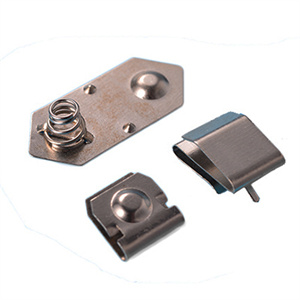The choice of material for battery contacts, which is a critical part of the connection between the battery and external devices, is crucial. These contacts need to have good electrical conductivity, corrosion resistance, and a certain mechanical strength to ensure the stable, safe and efficient operation of the battery. Here are some commonly used battery contact materials:
Copper: Copper is an excellent conductive material with low resistivity and good machinability. It is widely used in battery contacts, especially in applications where high conductivity is required.
Brass: Brass is an alloy of copper and zinc with good electrical conductivity and certain corrosion resistance. It is commonly used in battery contacts, especially in moderately corrosive environments.
Tinned copper: A layer of tin is plated on the surface of the copper to improve the corrosion resistance and abrasion resistance of the contacts. This material is often used in applications that require high durability, such as in automotive batteries.
Stainless steel: Stainless steel has good mechanical strength and corrosion resistance, but is slightly inferior to copper and brass in terms of electrical conductivity. Therefore, it is mainly used in those contacts where mechanical strength is required.
Silver alloy: Silver is an excellent conductive material, but the cost is higher. As a result, silver is often alloyed with other metals such as copper, nickel, etc., to reduce costs and improve other properties. The silver alloy contacts have high conductivity and good wear resistance, which is suitable for high-end batteries.
Copper alloy:
Phosphor bronze: good conductivity, elasticity and fatigue resistance. Battery contacts commonly used in consumer electronic products, such as cell phone battery contacts.
Beryllium bronze: with high strength, high hardness and good conductivity, it is suitable for occasions with high requirements on contact strength, such as the contact of electric vehicle battery pack.
Nickel alloy: nickel chromium alloy, with good oxidation resistance and corrosion resistance, can maintain stable performance in severe environment. Commonly used in industrial equipment and battery contacts used in some special environments.
Silver alloy: it combines the good conductivity of silver with the abrasion and oxidation resistance of nickel. Used in battery contacts that require high conductivity and require good wear resistance, such as those in high-end instrumentation.
Gold Plated Materials: Gold plating is usually applied to surfaces of copper or other base materials. Gold has excellent conductivity and corrosion resistance, which can effectively reduce the contact resistance and improve the reliability and stability of the contact. Battery contacts commonly used in precision electronic equipment, such as watches, medical equipment, etc.
In addition to the above materials, there are other materials such as nickel, aluminum, etc., which may also be used as battery contact materials in some specific occasions. When selecting battery contact materials, it is necessary to comprehensively consider factors such as conductivity, corrosion resistance, mechanical strength, cost and use environment.
